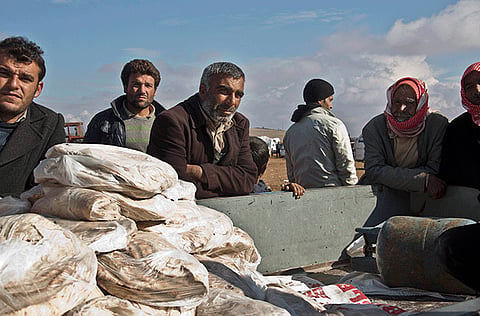Residents trickle into Syria’s Kobani as Daesh is expelled
Officials ask residents not to return yet due to lack of basic necessities

Beirut: Jubilant residents began trickling back to Kobani on Tuesday after Kurdish fighters drove Daesh from the Syrian border town, which became a major symbol of resistance against the militants.
But officials warned that Daesh militants were still present in villages around Kobani, and that massive reconstruction was needed in the devastated town after more than four months of fighting.
Its recapture has deprived Daesh of a strategic prize on the frontier with Turkey to add to its self-styled caliphate spanning swathes of Syria and Iraq.
An estimated 200,000 people living in Kobani and surrounding villages had fled across the border into Turkey after the fight for the town began on September 16.
The Kurdish People’s Protection Units (YPG) announced the “liberation” of Kobani on Monday.
“Our forces fulfilled the promise of victory,” the militia said in a statement, cautioning that fighting in the area was not over yet.
“The process to ultimately liberate Kobani canton (region) is ahead of us. We pledge that we will successfully carry out this promise as well.”
There was fighting in villages around the town on Tuesday, both to the southeast and the southwest, according to the Syrian Observatory for Human Rights, a Britain-based monitor.
Kobani activist Mustafa Ebdi said the US-led coalition fighting Daesh carried out fresh air strikes around the town on Monday evening and Tuesday morning.
After a night of celebration, the first residents of Kobani began to return to the town on Tuesday, although in small numbers.
“People are very glad. They are celebrating. Morale is very high,” said Edris Nassan, deputy foreign minister for the local Kobani regional government, speaking from inside the town.
But he said the local government was urging residents to wait before going home.
“There is massive destruction. At least 50 per cent of the city is destroyed,” he said.
“We are asking them to wait and not come immediately because we don’t have basic necessities for them. There is no food, no medicine. We don’t have electricity or water.”
Nassan said the local government would now appeal to the international community for help.
“We need aid. We need experts for reconstruction. We also need weaponry to continue to fight,” he said.
“This is the first stage, the liberation of Kobani. The next stage is the liberation of the villages.”
The expulsion of Daesh from Kobani marks a key symbolic blow against the group, which set its sights on the town in a bid to expand its control over a stretch of the Turkey-Syria border.
As the Kurdish militia raised their flags over Kobani, Turkish President Recep Tayyip Erdogan said his country opposed the idea of a Kurdish-controlled autonomous government in northern Syria.
“We do not want a new Iraq. What’s this? Northern Iraq,” Erdogan told Turkey’s Hurriyet newspaper.
“A northern Syria there after northern Iraq... It is not possible for us to accept this,” he said.
At one point, the militant group looked poised to take control of the town.
It vastly outgunned the YPG forces, wielding sophisticated weaponry captured from Iraqi and Syrian military bases and fielding fighters from around the world.
It lost nearly 1,200 fighters in the battle for Kobani, of a total of nearly 1,800 killed, according to the Observatory.
Analysts said air strikes by the US-led coalition had been key to the Kurdish success, taking out some of the militants’ heavier weaponry and hitting their supply routes.
Forces from the Iraqi Kurdish Peshmerga, as well as some Syrian Arab opposition forces, also reinforced the YPG in the fight.
Daesh emerged in Syria in 2013, and quickly captured large areas there and in neighbouring Iraq, imposing its harsh interpretation of Sharia.
But analysts said the loss of Kobani could put the brakes on its plans for expansion.
“Despite all that manpower, all that sophisticated weaponry, Daesh couldn’t get the city, so it’s a big blow for their plans and it’s a great achievement for the Kurds,” said Kurdish affairs analyst Mutlu Civiroglu.
Sign up for the Daily Briefing
Get the latest news and updates straight to your inbox



